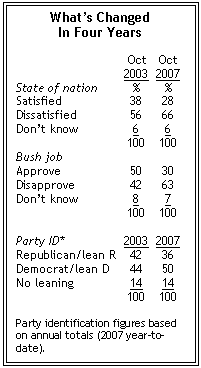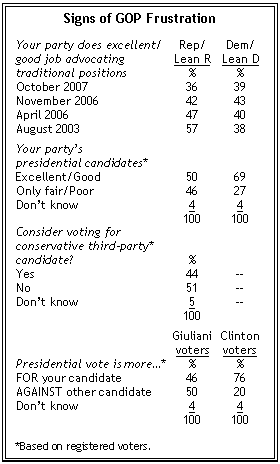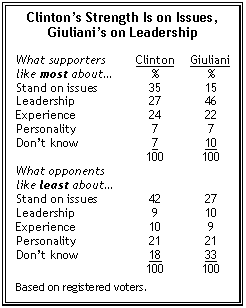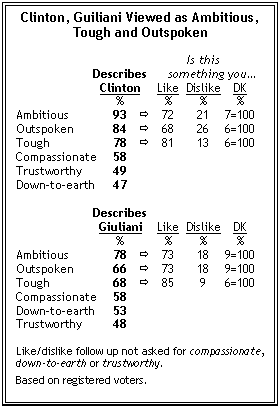Introduction and Summary
A year before the 2008 presidential election, most major national opinion trends decidedly favor the Democrats. Discontent with the state of the nation is markedly greater than it was four years ago. President Bush’s approval rating has fallen from 50% to 30% over this period. And the Democrats’ advantage over the Republicans on party affiliation is not only substantially greater than it was four years ago, but is the highest recorded during the past two decades.

The public continues to express more confidence in the Democratic Party than in the Republican Party as being able to bring about needed change, to govern in an honest and ethical way and to manage the federal government. The Democratic Party’s advantages on these traits are much wider than during the last presidential campaign. Moreover, they remain about as large as they were just prior to the 2006 midterm election, in spite of rising public discontent with the Democrat-led Congress.
The voters’ issues agenda also appears to benefit the Democrats. Along with Iraq, the economy, health care and education rate as the most important issues for voters. Compared with the 2004 campaign, fewer voters now place great importance on the issues that have animated Republican political unity in recent years — including gay marriage, abortion and terrorism.
Looking to the presidential election itself, the political climate appears to be affecting the morale of those in both parties. Democrats are more positive and more enthused than are Republicans. Since the beginning of the year, Democrats have closely followed campaign news at consistently higher rates than have Republicans, and somewhat greater proportions of Democrats say they have given a lot of thought to the presidential candidates.
Republicans not only are less engaged in the campaign, but they also rate their party’s presidential candidates more negatively than do Democrats. Nearly half of Republicans and Republican-leaning independents (46%) rate the Republican presidential candidates as only fair or poor; by comparison, just 28% of Democrats and Democratic-leaning independents give the Democratic presidential field comparably low ratings.
The latest national survey by the Pew Research Center for the People & the Press, conducted Oct. 17-23 among 2,007 adults, finds that Hillary Clinton remains the clear favorite for the Democratic nomination. Clinton leads Barack Obama, her closest rival, 45%-24% among Democratic and Democratic-leaning registered voters. Clinton holds a substantial advantage over Obama and other rivals among most key Democratic voter groups, including liberals and African Americans. College graduates are among the only Democratic groups that splits its support between Clinton and Obama.

The nomination race among Republicans is more fluid, reflecting sharp ideological divides within the party. Giuliani maintains a modest 31%-18% lead over John McCain, with Fred Thompson at 17%, among Republican and Republican-leaning registered voters. Giuliani’s lead has remained fairly stable since March, while Thompson has faltered a bit recently and McCain has lost support over a longer period of time. Since September, Mike Huckabee’s standing has increased from 4% to 8%, giving him virtually the same level of support as Mitt Romney (9%).
The GOP nomination race among Republican evangelicals, in particular, appears to be wide open: Giuliani, McCain and Thompson each draw about 20% of the vote among white Republican and Republican-leaning evangelical voters, with Huckabee and Romney getting about 10% each.
In addition, a solid majority of Republican white evangelicals (55%) say they would at least consider voting for a conservative third-party candidate if the general election is between Giuliani and Clinton. Overall, 44% of Republicans and Republican-leaning voters say they would consider backing a third-party candidate who holds more conservative positions than Giuliani on social issues like abortion and gay marriage.
Sen. Clinton holds a 51%-43% advantage over Giuliani in a general election ballot test among all registered voters. Clinton’s lead over Giuliani reflects her strong backing from women (57%-37%). Giuliani runs slightly ahead of her among men (49%- 44%). Clinton’s support is strongest among women voters younger than 50 (60%-36%), while Giuliani’s support is greatest among men in the same age group (52%-45%). Younger women also are the voting group that most often says that, apart from their feelings about Clinton, it would be a good thing to elect a female president. Nearly half (47%) express this opinion, compared with just 34% of older women and 24% of men.

Clinton’s supporters are much more positive about her candidacy than are Giuliani’s. Roughly three-quarters of voters who favor Clinton (76%) say their choice is more a vote for the New York senator, compared with 20% who say their choice is mostly a vote against Giuliani. By contrast, Giuliani’s support is divided fairly evenly between those who see their choice as a vote for Giuliani (46%) and those who say it is a vote against Clinton (50%).
Voters who favor Clinton more often cite her positions on issues as the reason they support her (35%), but many also mention her leadership ability (27%) and experience (24%). Giuliani’s support is much more based on his leadership ability (46%), and much less on his positions on issues (15%).
In fact, Giuliani’s stances on issues are cited less as a reason to support him than has been the case for any presidential candidate since 1992. At the same time, more of his supporters cite his leadership ability as what they like most about him than have the supporters of any candidate in the same period, including George Bush during his reelection campaign in 2004 (46% Giuliani vs. 41% for Bush in September 2004).
As is typically the case, opponents of both Clinton and Giuliani more often cite their positions on issues, rather than leadership, personality or other factors, as the main reason why they are not supporting them. Roughly four-in-ten Giuliani supporters (42%) say Clinton’s positions on issues are what they like least about her; 21% cite Clinton’s personality. Clinton supporters are more divided over what they do not like about Giuliani, and a relatively large minority (33%) offered no response. A plurality of those who did give an answer cited Giuliani’s positions on issues (27%), while 21% mentioned his personality.

The survey finds that in some respects, voters hold similar perceptions of the personal qualities of the New York senator and former New York City mayor. Overwhelming majorities describe Clinton as ambitious (93%), outspoken (84%) and tough (78%). Somewhat smaller, though substantial, majorities also associate these qualities with Giuliani. Smaller percentages see both candidates as compassionate and down-to-earth, and only about half view Clinton (49%) and Giuliani (48%) as trustworthy.
In a follow-up question, voters say that they like Clinton and Giuliani’s ambition, outspokenness and toughness. However, a slightly larger number say they dislike Clinton’s outspokenness than say they dislike this quality in Giuliani (26% vs. 18%). In addition, voters have a more positive view of such qualities as outspokenness and toughness in a hypothetical female leader than they do when those same qualities are associated with Clinton.
Overall, a large majority of the public (64%) says that if Hillary Clinton becomes president, Bill Clinton would have positive influence on the way she does her job. But far fewer people (45%) say they like the idea of the former president “being back in the White House.”
Men and women are about equally positive about Bill Clinton’s influence on Hillary Clinton, but fewer women than men say they like the idea of the former president returning to the White House (40% vs. 52%). Older women are less likely than younger women to say they like the idea of Bill Clinton returning to the White House. White evangelical Protestants also are quite negative about this prospect; fully 58% say they dislike the idea of Bill Clinton being back in the White House.
The public is divided about whether Hillary Clinton would govern the country differently from her husband. About half (48%) say Hillary Clinton’s government style would be similar, while 45% say it would be different. Most Republicans believe that Hillary Clinton’s style of governing would be similar to Bill Clinton’s — and by two-to-one those who express this opinion see it as a bad thing. Democrats and independents are less certain about Sen. Clinton’s governing style; those who believe Hillary Clinton’s approach will be different from Bill Clinton’s generally see this as a good thing, as do those who believe her approach will be similar.